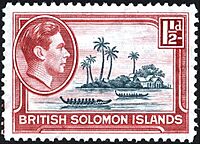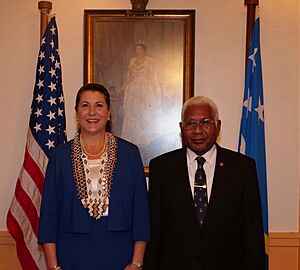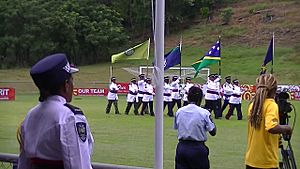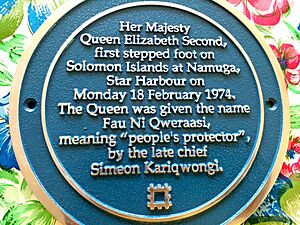Monarchy of Solomon Islands facts for kids
Quick facts for kids King of Solomon Islands |
|
|---|---|
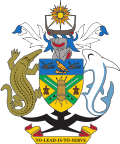
Coat of arms of Solomon Islands
|
|
| Incumbent | |
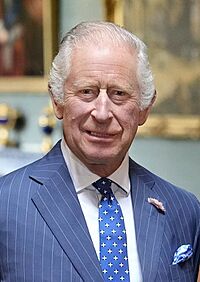 |
|
| Charles III since 8 September 2022 |
|
| Details | |
| Style | His Majesty |
| Heir apparent | William, Prince of Wales |
| First monarch | Elizabeth II |
| Formation | 7 July 1978 |
The monarchy of Solomon Islands is a system of government where a monarch (a king or queen) is the official head of state. This role is passed down through their family. Since September 8, 2022, King Charles III has been the monarch of Solomon Islands. He represents the "Crown of Solomon Islands."
Even though King Charles III is also the monarch of 14 other independent countries in the Commonwealth of Nations, each country's monarchy is separate. This means he is officially called the King of Solomon Islands. He and other members of the royal family perform public duties for Solomon Islands. However, only the King has a role in the country's laws.
The King holds all the main government power, but he doesn't use it directly. For new laws to be made by the National Parliament of Solomon Islands, the King's approval (called royal assent) is needed. Most of these powers are used by elected members of parliament, government ministers, and judges.
Today, the Crown helps ensure stable government. It also acts as a neutral protector against anyone trying to misuse power. While the King has some special powers, most of his duties are carried out by his representative in Solomon Islands. This person is called the Governor-General of Solomon Islands.
Contents
History of the Monarchy
In the late 1800s, European countries like Germany and Britain took control of different parts of the Solomon Islands. In 1893, Britain declared the British Solomon Islands Protectorate. This was done to manage contact between islanders and European settlers. It also helped prevent France from taking over.
Colonial rule began in 1896. During World War II, there was fierce fighting in the Solomon Islands. This included the famous Battle of Guadalcanal. After the war, Honiara became the new capital city. The islands then began their journey towards becoming an independent country.
Over the years, Solomon Islanders gained more say in their government. In 1960, councils were set up with some elected islanders. By 1974, a new constitution greatly reduced the British Governor's power. It also created the role of Chief Minister. Solomon Islands became fully self-governing in 1976.
The country became a sovereign state and an independent constitutional monarchy on July 7, 1978. Queen Elizabeth II became the first head of state and Queen of Solomon Islands. Prince Richard, Duke of Gloucester represented the Queen at the independence celebrations. He gave a speech in Pijin, saying it was a "big day" for the country.
The Crown of Solomon Islands

Solomon Islands is one of fifteen independent nations that share the same monarch. These are called Commonwealth realms. The monarch's connection to Solomon Islands is completely separate from his role as monarch of any other country. Even though they share the same person as their King, each Commonwealth realm is independent.
The King of Solomon Islands is represented in the country by a viceroy. This person is the governor-general of Solomon Islands.
Since Solomon Islands became independent in 1978, the Crown has had a shared and a separate identity. The King's role as monarch of Solomon Islands is different from his role as monarch of the United Kingdom or any other realm. This means the monarchy became a "domesticated" institution in Solomon Islands.
This separation is shown in several ways. For example, the King has a special Solomon Island title. When he acts as a representative of Solomon Islands, he uses national symbols. These include the country's national flag and unique royal symbols. Also, only Solomon Island government ministers can advise the King on matters concerning Solomon Islands.
In Solomon Islands, the government is legally known as "His Majesty in right of Solomon Islands."
The King's Title
When Queen Elizabeth II became head of state in 1978, she didn't have a specific Solomon Island title at first. In 2013, the National Parliament passed a law called the Royal Style and Titles Act 2013. This law officially gave the monarch a separate title for Solomon Islands.
The Queen's official title became: Elizabeth the Second, by the Grace of God, Queen of Solomon Islands and Her other Realms and Territories, Head of the Commonwealth.
Since King Charles III became monarch, his title is: Charles the Third, by the Grace of God, King of Solomon Islands and His other Realms and Territories, Head of the Commonwealth.
When Queen Elizabeth II first visited Solomon Islands in 1974, a chief gave her the title Fau Ni Qweraasi. This means "a people’s protector."
Oath of Allegiance
People in certain roles in Solomon Islands swear an oath of allegiance to the monarch. This shows their loyalty to the state. The monarch, in turn, promises to govern the people according to their laws and customs.
The oath of allegiance in Solomon Islands is:
"I, (name), swear [or solemnly affirm] that I will be faithful and bear true allegiance to His Majesty King Charles the Third, His Heirs and Successors, according to law. [So help me God.]"
Succession to the Throne

Solomon Islands follows the same rules as the United Kingdom to decide who becomes the next monarch. This is called the line of succession.
Succession is based on absolute primogeniture. This means the eldest child, regardless of gender, inherits the throne. The rules are set by laws like the Succession to the Crown Act 2013. These laws state that only natural, legitimate descendants of Sophia, Electress of Hanover, can inherit the throne. They also say the monarch cannot be a Roman Catholic and must be part of the Church of England.
When a monarch dies or steps down, their heir immediately becomes the new monarch. There is no need for a special ceremony to confirm this. A period of mourning usually follows, with flags flown at half-mast. A day of mourning might also be a public holiday.
The King's Role in Government
The Constitution of Solomon Islands gives the country a parliamentary system of government. This is similar to other Commonwealth realms. All the government's power comes from the monarch. The governor-general represents the monarch in the country. The National Parliament chooses the governor-general.
The King and governor-general have both legal and practical roles. The Solomon Islands government is formally called His Majesty's Government of Solomon Islands.
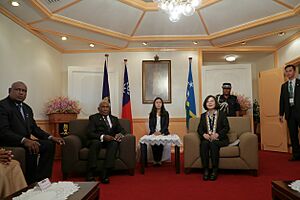
The many powers belonging to the Crown are known as the Royal Prerogative. These include making treaties and sending ambassadors. They also include duties like defending the country and keeping the peace.
Executive Power
The prime minister leads the Cabinet of Solomon Islands. The prime minister advises the King or governor-general on how to use their powers. These powers cover all government operations and foreign affairs. The King's role is mostly symbolic. He represents the legal authority under which the government works. The Cabinet directs how the Royal Prerogative is used. This includes declaring war or setting election dates.
The King also has a few specific duties, like appointing the governor-general.
The members of the National Parliament elect the prime minister. The governor-general then appoints a Cabinet based on the prime minister's choices. The King is kept informed about changes in government, like when a prime minister resigns or a new one is sworn in.
Foreign Affairs
The King's powers also extend to foreign affairs. The King or governor-general can negotiate and approve treaties with other countries. Parliament's approval is not always needed for this. However, a treaty cannot change Solomon Islands' domestic laws without a new Act of Parliament. The governor-general also welcomes diplomats from other countries.
Parliament's Role
All laws in Solomon Islands need the governor-general's approval (royal assent) in the King's name. This approval cannot be refused. The governor-general also calls for, suspends, and dissolves parliament. After parliament is dissolved, new elections are usually called by the governor-general.
A new parliamentary session begins with the State Opening of Parliament. During this event, the King or the governor-general reads a speech outlining the government's plans.
Courts and Justice
The King is responsible for ensuring justice for all his people. He is seen as the "fount of justice." In Solomon Islands, crimes are legally considered offenses against the King. Court cases for serious crimes are brought in the King's name. For example, a case might be called The King versus [Name].
The governor-general, on behalf of the King, can also grant immunity from prosecution. They can also use the royal prerogative of mercy to pardon offenses or reduce prison sentences. This power is described in the Constitution.
Judges of the High Court of Solomon Islands are appointed by the governor-general. This is done based on advice from the Judicial and Legal Service Commission.
Cultural Role of the Monarchy
The King's Official Birthday is a public holiday in Solomon Islands. It is usually celebrated on the second Saturday of June each year. This day is a very important event in the country. The celebrations often start with a police marching band in Honiara. Rallies, sporting events, and traditional dancing take place across the islands. Parties continue late into the night.
The governor-general gives a speech on the King's Birthday. Awards and medals are given to people who have served Solomon Islands well.

Honours and Awards
The monarch is the source of all honours and awards. As the Sovereign of Solomon Islands, the King gives out awards and honours in his name. These are often given based on advice from Solomon Island government ministers.
In 1981, the Order of Solomon Islands was created. This order has three levels: the Star of Solomon Islands, the Cross of Solomon Islands, and the Solomon Islands Medal. In 1982, Queen Elizabeth II was the first person to receive the Star of Solomon Islands. King Charles III received the same honour in 2024.
The Police Force

The Police Force of Solomon Islands is known as the "Royal Solomon Islands Police Force". Queen Elizabeth II gave them the title "Royal" in 1978.
The Crown is at the top of the Royal Solomon Islands Police Force. All police officers must swear loyalty to the monarch of Solomon Islands before they start their job. The oath they take is:
"I, (name), Swear by Almighty God that I will well and truly serve His Majesty, King Charles the Third, King of Solomon Islands and will execute the powers and duties of my office honestly, faithfully and diligently without favour or affection, malice or ill-will towards any person and I will obey, uphold and maintain the laws of Solomon Islands. To the best of my power, I will seek and cause the peace to be preserved and will prevent all offences against the peace to the best of my skill and knowledge, and discharge all duties faithfully according to law."
St. Edward's Crown appears on the police force's badges. This shows that the monarchy is the source of their authority.
Royal Visits to Solomon Islands
Members of the royal family have visited Solomon Islands many times. Prince Philip, Duke of Edinburgh visited in 1959 and 1971. The Duke and Duchess of Kent visited in 1969.
Queen Elizabeth II first visited in 1974 with Prince Philip and other family members. In 1978, Prince Richard, Duke of Gloucester attended the independence celebrations. The Queen and her husband visited again in October 1982.
The Duke and Duchess of Gloucester visited in August 2008. They attended a parade for the 30th Independence Anniversary. They also visited schools, hospitals, and war memorials. The Duke spoke to the National Parliament.
Prince William and Catherine, the Duke and Duchess of Cambridge, visited in September 2012. This visit celebrated the Queen's Diamond Jubilee. They enjoyed panpipe performances and traditional dances. They also visited a memorial to the Coast Watchers and traveled by traditional war canoe.
Charles, Prince of Wales (now King Charles III) visited in November 2019. He attended a church service and a wreath-laying ceremony. He also spoke to the National Parliament.
Discussions About Becoming a Republic
When Solomon Islands became independent, some people wanted to keep the monarchy. Others in the government wanted to become a republic, with an elected president instead of a monarch.
Over the years, there have been several discussions and committees about changing the constitution. Some proposals suggested having an indigenous (local) Solomon Islander as president. These presidents might have had more powers than the governor-general. However, these proposals were not fully put into action.
After civil unrest in the late 1990s, new efforts were made to review the constitution. Drafts for a new federal constitution were created in 2004, 2009, and 2011. These drafts suggested Solomon Islands become a federal republic. A revised draft was released in 2018.
In 2022, Prime Minister Manasseh Sogavare said his government aimed to enact a new federal constitution by 2026. In 2023, the constitution was amended to create a process for this. This included forming a Constituent Assembly to approve a final constitution.
A poll in 2023 showed that 59% of people in Solomon Islands supported having a democratically elected head of state. 34% wanted to keep the monarchy, and 7% were unsure.
List of Solomon Island Monarchs
| Portrait | Regnal name (Birth–Death) |
Reign over Solomon Islands | Full name | Consort | House | |
|---|---|---|---|---|---|---|
| Start | End | |||||
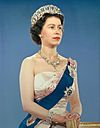 |
Elizabeth II (1926–2022) |
7 July 1978 | 8 September 2022 | Elizabeth Alexandra Mary | Philip Mountbatten | Windsor |
| Governors-general: Sir Baddeley Devesi, Sir George Lepping, Sir Moses Pitakaka, Sir John Lapli, Sir Nathaniel Waena, Sir Frank Kabui, Sir David Vunagi Prime ministers: Peter Kenilorea, Solomon Mamaloni, Ezekiel Alebua, Francis Billy Hilly, Bartholomew Ulufa'alu, Manasseh Sogavare, Allan Kemakeza, Snyder Rini, Derek Sikua, Danny Philip, Gordon Darcy Lilo, Rick Houenipwela |
||||||
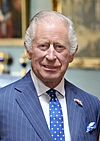 |
Charles III (born 1948) |
8 September 2022 | present | Charles Philip Arthur George | Camilla Shand | Windsor |
| Governors-general: Sir David Vunagi, Sir David Tiva Kapu Prime ministers: Manasseh Sogavare, Jeremiah Manele |
||||||
Images for kids
 | John T. Biggers |
 | Thomas Blackshear |
 | Mark Bradford |
 | Beverly Buchanan |


